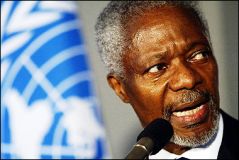World must protect Darfur civilians, using force if necessary – Annan
May 5, 2006 (UNITED NATIONS) — Secretary-General Kofi Annan says the international community has an obligation to protect civilians in conflict-wracked Darfur using force if necessary, and he urged all countries to press the warring parties to reach a peace deal.
 At last September’s U.N. summit, Annan said, world leaders “pledged solemnly, individually and collectively to take responsibility for the protection of people in such situations, arguing that it is a responsibility of each member state to protect” its own people.
At last September’s U.N. summit, Annan said, world leaders “pledged solemnly, individually and collectively to take responsibility for the protection of people in such situations, arguing that it is a responsibility of each member state to protect” its own people.
“But where they fail, or are unable to do so, or they themselves are the perpetrators, the international community, through the (Security) Council, has to take action, and, if need by, by force,” Annan said in an interview Thursday on “The NewsHour with Jim Lehrer” on PBS television.
“And now we have to redeem that pledge, that solemn pledge of September,” he said.
The responsibility of countries to protect civilians facing genocide, war crimes, crimes against humanity or ethnic cleansing was one of the most important results of the U.N. summit. Annan’s call for countries to exercise that responsibility in Darfur, using force if needed, marked the first time that he invoked the summit pledge.
The three-year conflict between Darfur’s rebels, mainly ethnic African farming tribes, and the Arab-dominated central government has killed about 180,000 people _ mostly through disease and hunger _ and displaced 2 million.
Annan said the 7,000 African Union soldiers in Darfur must be strengthened and given logistical support to help implement any peace deal and provide better security for the displaced people and the refugees. The African Union troops also need financial support until a U.N. peacekeeping force takes over, he said.
The Sudanese government has refused to allow a U.N. planning team into Darfur to start planning for a U.N. mission. But the government has said it will talk to the U.N. if a peace agreement is reached in Abuja, Nigeria, where African Union-mediated negotiations are at a critical stage.
Annan urged all those with influence to press the warring parties in Abuja “to seize the moment and make … a real agreement, that will stand the test of time on the ground.”
If a peace deal is reached, Annan said he expects the Sudanese government to begin serious talks about a U.N. force taking over.
“If the Sudanese had been able to protect their own people and prevent what is going on in Darfur, we would not even be talking about deployment of U.N. troops,” the secretary-general said. “Having failed to do so, I think they have an obligation to accept help from the international community to help with their protection.”
Annan cautioned that even if an agreement is signed, the displacement of people will not stop immediately.
“It will help, but it will take some time,” he said. “You know, with these things, by the time you get the order down to the men on the ground fighting and get it down all the way to the lowest level, it does take a bit of time.”
Earlier Thursday, Annan met at U.N. headquarters with a group of countries that are Friends of Darfur.
He told reporters afterward it was essential to strengthen the African Union force and find additional money to provide food and medicine for the millions of displaced people, whose rations have just been cut in half because of a shortage of funds.
“The members seem anxious to help,” Annan said, “and they are going to do whatever they can, both in terms of sending messages to the people in Abuja and to the government, and also trying to help us raise money for the humanitarian activities.”
(ST/AP)
